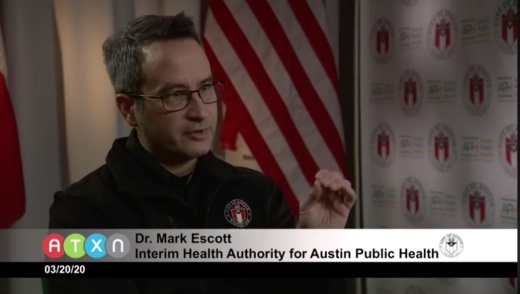Austin and Travis County officials reported March 20 the number of coronavirus cases locally rose from 41 positive tests on March 19 to 58 on March 20.
In addition to the updated statistics, the city and the county adopted new orders to align with the restrictions the state of Texas has announced.
On March 19, Gov. Greg Abbott issued an order prohibiting social gatherings of more than 10 people. Austin and Travis County had issued similar orders on March 17, but the new local orders add additional clarification.
The new local orders close local gyms, massage parlors and schools, and also close visitation for nursing homes, retirement homes and long-term care facilities—all in accordance with Abbott's order.
The original local orders already listed some businesses exempt from the orders, and the March 20 update added to the list of exemptions—including childcare facilities, veterinarian services, homeless shelters, homeless encampments and nonprofits providing food to low-income individuals. All of those locations are "encouraged to comply with physical distancing and sanitation measures," according to the city.
Agencies considered "critical infrastructure," including financial institutions, emergency services and transportation systems will also continue operating.
ORIGINAL STORY
With news March 19 of the first person-to-person spread of the coronavirus within the Austin community, Dr. Mark Escott, Austin Public Health interim health authority, said the actions local residents take now will determine how quickly the disease spreads in the weeks to come.
"It's important for us to understand right now we're at a critical stage in this evolving pandemic as it strikes the city of Austin and Travis County," Escott said.
Speaking March 20 at the Combined Transportation, Emergency, and Communications Center in Austin, Escott said Austin and Travis County residents should check themselves for cough and fever symtpomsbefore leaving the house for any reason, and, if feeling sick, residents should avoid the emergency room. Instead, they should call their doctor or using telehealth services, he said.
According to the latest numbers from city and county officials, there have been 41 cases of coronavirus confirmed locally. Escott said those cases have come in five "clusters"—or groups with related cases—and that more information will be available in the coming days.
On March 19, California Governor Gavin Newsom issued a statewide, mandatory stay-at-home order, telling residents to remain at home unless they are going out for essential needs. California has had 1,006 positive cases and 19 deaths.
Escott said public health officials are in touch with hospitals and medical care providers to look at models for the future and the capacity of health care infrastructure, and further restrictions could be put in place if the local health care system starts to show signs of becoming overwhelmed.
"Our goal is that we don't have a rapid increase in cases which are going to exceed our health care capacity. If we do, that could lead to unnecessary deaths," Escott said.
Earlier March 20, Sendero, the low-income resident health care coverage plan owned by Central Health, announced it would provide free telemedicine consultations for its members and waive copayments and testing costs for members who receive coronavirus tests with in-network providers and laboratories.
The nonprofit health care plan managed by the county enrolls thousands of low-income members. The organization said in a release it is reaching out to its most high-risk patients via telephone.





